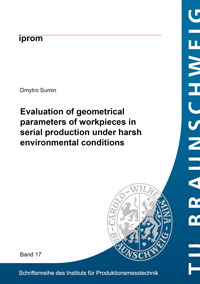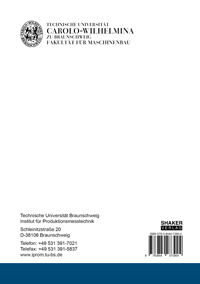
Shop : Details
Shop
Details
48,80 €ISBN 978-3-8440-7390-4Softcover178 pages87 figures263 g21 x 14,8 cmEnglishThesis
June 2020
Dmytro Sumin
Evaluation of geometrical parameters of workpieces in serial production under harsh environmental conditions
Thermal expansion is a property of materials, which was discovered a long time ago, comprehensively studied and explained. However, the consideration of the effect in the field of metrology if often not trivial.
It is accepted state of technology to integrate measurement processes into a production process with the aim of establishing quality control loops. That make the production process robust against a variety of disturbing influence factors. According to existing standards geometrical measurements should be performed under controlled environmental conditions. Particularly the temperatures of the measuring instrument, the workpiece and the air must be adjusted to 20 °C (normal temperature).
In observance of the above stated requirement causes errors due to of thermal expansion of the materials. Investment in air-conditioning equipment may turn out to be quite expensive, especially for companies in developing countries with tropical climate. High-end measuring instruments with thermal compensation equipment and thermal enclosures (the equipment allowing to isolate a measuring instrument from the surrounding area to maintain constant temperature conditions of the instrument) exist, but they are not always affordable, too.
The aim of this research project is to develop and investigate an alternative method how to perform measurements under non-normal conditions and correct the results afterwards without having knowledge about the construction details of the measuring instrument nor current thermal conditions of any object, involved in the measurements.
It is accepted state of technology to integrate measurement processes into a production process with the aim of establishing quality control loops. That make the production process robust against a variety of disturbing influence factors. According to existing standards geometrical measurements should be performed under controlled environmental conditions. Particularly the temperatures of the measuring instrument, the workpiece and the air must be adjusted to 20 °C (normal temperature).
In observance of the above stated requirement causes errors due to of thermal expansion of the materials. Investment in air-conditioning equipment may turn out to be quite expensive, especially for companies in developing countries with tropical climate. High-end measuring instruments with thermal compensation equipment and thermal enclosures (the equipment allowing to isolate a measuring instrument from the surrounding area to maintain constant temperature conditions of the instrument) exist, but they are not always affordable, too.
The aim of this research project is to develop and investigate an alternative method how to perform measurements under non-normal conditions and correct the results afterwards without having knowledge about the construction details of the measuring instrument nor current thermal conditions of any object, involved in the measurements.
Keywords: Koordinatenmetrologie; Produktionsmesstechnik; iprom
Schriftenreihe des Instituts für Produktionsmesstechnik
Edited by Prof. Dr.-Ing. Rainer Tutsch, Braunschweig
Volume 17
Available online documents for this title
DOI 10.2370/9783844073904
You need Adobe Reader, to view these files. Here you will find a little help and information for downloading the PDF files.
Please note that the online documents cannot be printed or edited.
Please also see further information at: Help and Information.
Please also see further information at: Help and Information.
| Document |  | Document | ||
| Type |  | |||
| Costs |  | 36,60 € | ||
| Action |  | Purchase in obligation and download the file | ||
| Document |  | Table of contents | ||
| Type |  | |||
| Costs |  | free | ||
| Action |  | Download the file | ||
User settings for registered online customers (online documents)
You can change your address details here and access documents you have already ordered.
User
Not logged in
Export of bibliographic data
Shaker Verlag GmbH
Am Langen Graben 15a
52353 Düren
Germany
Am Langen Graben 15a
52353 Düren
Germany
Mon. - Thurs. 8:00 a.m. to 4:00 p.m.
Fri. 8:00 a.m. to 3:00 p.m.
Fri. 8:00 a.m. to 3:00 p.m.
Contact us. We will be happy to help you.



